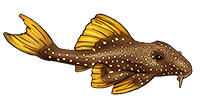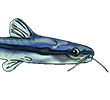Parameters: montreal tap water 8.0ph, 75F, nitrates 10ppm
Eggs were laid on the tops of leaves, and a few seem to have white egg fungus. First spawn of any otocinclus species appears to have a low viability rate for whatever reason, but improves with successive spawns. Eggs and new fry are identical to common otocinclus species, making them remarkably large for such a small species (each species has their own tank).
Since my tank is heavily planted it is difficult to see how many eggs she laid, but it appears to be at least ten. Spawning occurred during a large rainstorm spanning several days. Female got concerningly round, to where I was concerned she might have been ill, and appeared slightly agitated.
It will be interesting to see how the fry of this species develops. My hope is to get the babies to eat my homemade gel food, because the adults will eat nothing but natural algae and biofilms.





